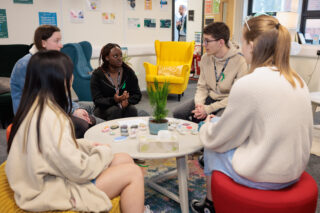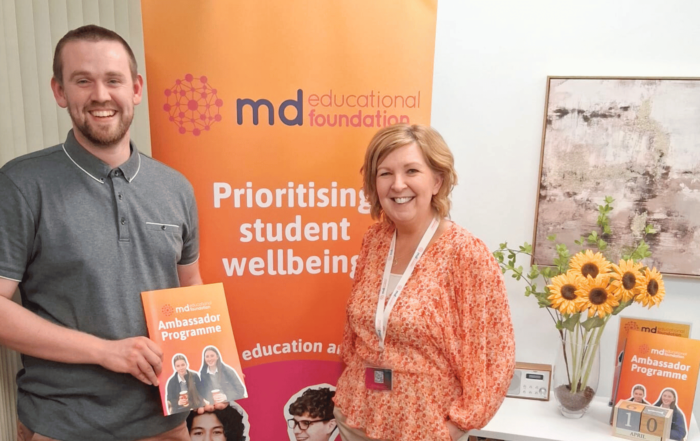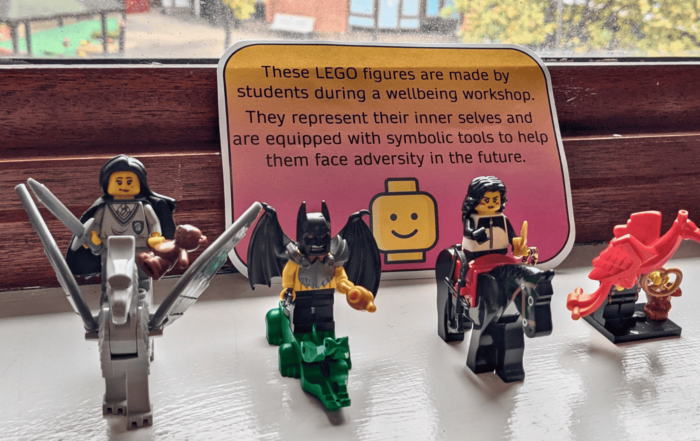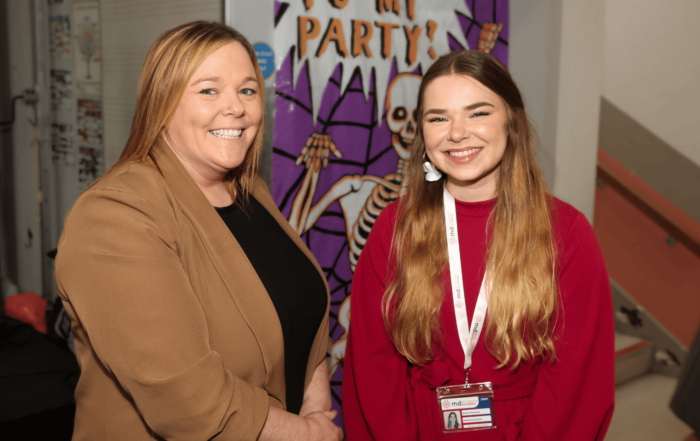Photos used in case studies are for representative purposes only.
“21% of 16-year-olds in Northern Ireland don’t know who to talk to about stress and worry.” This figure comes from the report by Mental Health Champion for Northern Ireland (2023): Factors Affecting Mental Health and Wellbeing in Children and Young People in Northern Ireland. It’s a particularly concerning statistic, given that the NHS Digital report (2023) also highlighted that the number of 17-19-year-olds with a probable mental disorder rose from 1 in 10 in 2017 to 1 in 5 in 2023.
The same report found that young people were found to be missing a safe space and a trusted person to talk to, especially in a school setting. The report also mentioned that ‘it has long been recognised as a barrier to accessing support and these findings suggest that stigma may prevent young people in Northern Ireland from seeking mental health support’. mdeducational foundation was created to address this gap in wellbeing support for post-16 students.
Below we wanted to share two touching student stories in the UK to showcase our charity’s impact on young people and their wellbeing. These two young people found support from their Wellbeing Lead placed in their school as they were facing struggles in their lives. Hesitant at first, the students found their way to the Wellbeing Lead’s welcoming space and eventually even brought their friends with them. The combination of the Wellbeing Lead’s supportive guidance and understanding ear, alongside the safety and comfort of the Wellbeing Hub empowered these two students to thrive again – through education and beyond.
We hope these case studies shed some light on the importance of prioritising accessible student wellbeing in schools and how life-changing this can be for young people.
Together, we can shape the future for the better and remove the stigma that still hangs over conversations about mental health and wellbeing.
Navigating change with the support of a Wellbeing Lead
“Throughout Year 12 and 13, I have struggled quite a lot with my mental health and with the transition from Year 11 to college.
I find it hard to cope with lots of change and found it quite overwhelming transitioning to KS5. However, when I learned about the Wellbeing Hub, it really helped me to cope with all the changes going on around me.
I struggle to deal with a lot of noise and busy places. Around college, during free periods or lunch breaks, it felt like there weren’t any places that I felt comfortable and happy going to. Everywhere felt too overwhelming to me.
That was until I found out about the Wellbeing Hub. I didn’t start using the space until near the end of Year 12 because I was worried that I would receive judgement. However, once I got the courage, it was the only place I’d spend my free time. Having a safe space where I could go and be in a peaceful, caring environment really helped me cope with everything I was dealing and struggling with. Being able to talk to the Wellbeing Lead, and receiving their guidance and support through my struggles really helped me get through my time at college.
Before going to the Wellbeing Hub, during my free periods and time off I would walk home and spend my time there instead. I think this affected my attendance a lot more than I realised. I would be late for my next lessons because I wouldn’t leave my house on time or I would miss lessons because I didn’t have the energy to go back.
I changed my routine and after going to the Wellbeing Hub during my free periods instead, my attendance improved a huge amount and I found that I was on time for a lot more lessons than I used to be. The Wellbeing Lead and I also mutually decided it would be best if I went on an attendance report, which really helped me with building up the motivation for going into college and definitely improved my attendance, which then impacted my learning.
Beforehand, I had little to no motivation to catch up on my work and hit my deadlines, that I didn’t think I was going to meet, but with the support and help from the Wellbeing Lead and the Wellbeing Hub, I managed to hand everything in that I needed to before it was too late. The Wellbeing Lead also provided me with revision guides and planners so I could organise my revision in a way that suited me best which really helped to boost my motivation.
Without the support I received from the Wellbeing Lead, I don’t think I would have handed in all of my work or gotten through my exams. They helped with, not just college work deadlines, but also deadlines for UCAS and university applications. The Wellbeing Lead supported me while writing my personal statement and made sure I completed it on time so that I wouldn’t miss out on my chances to apply. Without the help of the Wellbeing Lead and the Head of Year teachers, I don’t know whether I would have completed everything before the deadline.”
Finding strength and opening new doors with the help of a Wellbeing Lead
“I’ve always struggled with school and anxiety.
When I joined sixth form, I wasn’t confident in where or who to go to if I needed help and support.
However, when one of my friends started getting support from our school’s Wellbeing Lead, it introduced me to the Wellbeing Hub space. Knowing she could do it allowed me to gain the confidence to reach out too.
In the beginning, I started to have counselling sessions with YMCA, in which the Wellbeing Lead completed a referral for me to be able to do this. This allowed me to talk about things that I’ve never spoken to anyone before due to the fear of being judged or rejected. I then knew it was okay to talk about my struggles without it being a burden for someone else, which made me feel much safer in my environment at school. Even though this was a positive, I started to really struggle with eating habits due to low moods and stress. This made me avoid the school canteen (where my friend group always hung out) and that’s when I would regularly come into the Wellbeing Hub – it was a safe zone.
I would go there by myself but also bring my friends and we all fell in love with it. There were always activities to get involved in, from drawing and colouring; playing board or card games; helping to decorate the Wellbeing Hub for Christmas; or even having a quick power nap on the sofa. This was fun and also a good distraction if I was having a bad day. It was also nice to have good conversations happening also in the Wellbeing Hub about various topics that may be brought up.
The Wellbeing Lead helped me communicate my struggles with my family when needed and when I felt I couldn’t. My mum would even be invited in to speak to the Wellbeing Lead or would have conversations over the phone. This really helped me at home as I felt more understood. The Wellbeing Lead would always be there to support me, even if it was just for a quick chat, a walk around the school, a long conversation, or to help me find websites and other useful resources.
If I didn’t have this space at school I don’t think I’d have made it through education. As I live very close to the school, I’d probably just go home whenever I couldn’t handle it, which would reduce my motivation and attendance big time! This may have led to me dropping out completely as I was on the fence with that decision.
However, instead the Wellbeing Hub acted as a second home to me so I was able to go there, even just for a breath, and then be able to carry on. It kept me motivated as I felt supported and not alone.
I had many struggles during my time at sixth form, some bigger than others. One major thing is I had to make a decision on getting an abortion. My decision wasn’t easy and since it happened I really struggled with the decision I made, causing many low moods, anxiety, intrusive thoughts and struggles with family relationships. I didn’t know what to do with myself, but again, having the Wellbeing Lead’s support and care, and the Wellbeing Hub as a safe base, helped me so much. The Wellbeing Lead managed to find free counselling sessions that focused on decisions like mine. Without them, I wouldn’t have been able to find them. With that support, I was again able to speak freely without feeling judged or misunderstood. It really helped me to understand my journey and feelings.
Overall, my journey with personal struggles alongside doing A-Levels simultaneously was very difficult. But I got through it and have now completed my exams. This wouldn’t have happened if I didn’t have the Wellbeing Hub – using it as my safe zone and also a quiet, cosy place to study. I now have a much clearer mind and confidence in myself for future plans.
The Wellbeing Lead and Wellbeing Hub will never be forgotten.”
Some of our Wellbeing Hubs across the UK and Ireland
This is why we do what we do
These student stories showcase why we do what we do as a charity and why, now more than ever, intervention is needed. We know there is an urgent need for additional wellbeing support and we believe that young people need more than just an education at school. At mdeducational foundation, we are prioritising student wellbeing. We want all post-16 students to feel supported in every aspect of their wellbeing, helping them on their journey to a brighter future.
From the inspiring passion of our Co-Founders, Miriam Dervan (Founder of mdgroup and Executive Chair) and Tarquin Scadding-Hunt (CEO of mdgroup) for giving back to the local community, through to the daily dedication of our team to bring this vision to life, we are changing the script for today’s young people.
As our Co-Founder Miriam Dervan says:
“If we can help even one young person, it will be worth every single penny.”

Our amazing Wellbeing Leads, placed in schools and educational settings across the UK and Ireland, are promoting positive wellbeing to young people. They do this through the delivery of an age-appropriate, agile, bespoke wellbeing curriculum, specifically designed for post-16 students. Through various forms of programmes, they support students’ wellbeing by normalising student psychological fitness and resilience through guidance and early intervention. With our fully-funded support to place wellbeing professionals in schools, our Wellbeing Leads are pioneering a future for better wellbeing for young people, so they are more empowered, no matter what their challenges are.
With thousands of students already supported, we remain committed to expanding our support and continuing our journey towards a world in which every student has access to the wellbeing support they need, without delay.
Head to our website’s Our Impact page for more stories and to hear from post-16 students, school staff, Wellbeing Leads and other powerful community voices. In a previous blog, we also shared a case study from a grateful parent, who told her story about witnessing her own daughter’s journey of strength in the face of adversity, thanks to the support from her school’s Wellbeing Lead – You can read the case study here.
—————————————————————————————————
Photos used in case studies are for representative purposes only.
Prioritising student wellbeing through education and beyond
mdeducational foundation is a charity that provides a three-year salary-funded commitment to placing dedicated wellbeing professionals within educational settings, enabling them to kickstart their long-term wellbeing strategies.
Related posts
Championing student wellbeing: Meet James Sweeney, the first mdeducational foundation Ambassador
At mdeducational foundation, we’re committed to prioritising student wellbeing - and now, we’re continuing that mission by inviting members of our community to join us in championing a brighter future for young people. We’re [...]
6 mental health workshops to support and improve the wellbeing of young people in schools
Wellbeing workshops are a great way to promote positive wellbeing, encourage young people to look after their mental health and remove the stigma around mental health and wellbeing. In schools, workshops can provide many [...]
Shining the spotlight on student wellbeing: Meet Susanna Neuvonen, Marketing Executive at mdeducational foundation
At mdeducational foundation, we’re dedicated to prioritising student wellbeing by providing fully funded support in schools and educational settings across the UK and Ireland. Our mission is to ensure that all post-16 students feel supported [...]







